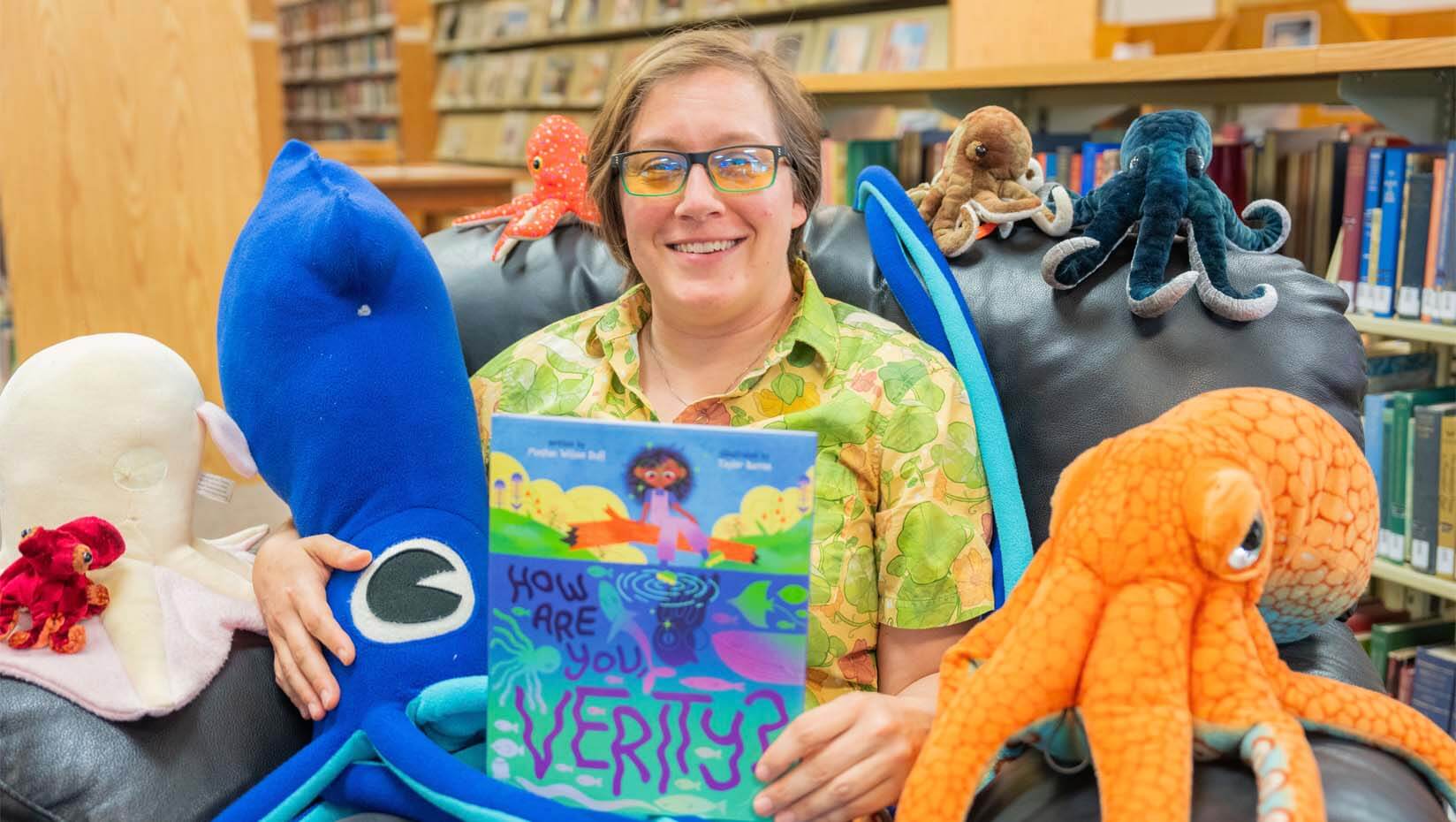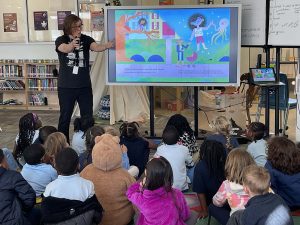
Through teaching and writing, Meghan Duff strives to create safer spaces to learn

Meghan Wilson Duff spends their time trying to understand people. Coming from a background in clinical psychology, the associate professor at the University of Maine at Machias has found ways to connect with young people through teaching at the school’s tight-knit campus community, and also by writing a children’s book called “How Are You, Verity?” that focus on the story of a curious, neurodivergent child who loves marine science.
Duff grew up, as they say, “all over New England.” They were born in New Hampshire, grew up in Vermont and went to high school in Massachusetts while regularly visiting family in Maine. As an undergraduate, they studied Russian language and linguistics and physical anthropology and human biology at Emory University. They chanced into the world of clinical psychology after college, when they were offered a job as an aide to a Russian adoptee student at an elementary school in their hometown.
“They were looking for somebody who spoke Russian and I spoke passable Russian,” Duff says. “That’s how I ended up in clinical psychology: working with a child who was really struggling because of the cultural and language differences and the challenges of being adopted.”
After that experience, Duff received a doctoral degree in clinical psychology from Antioch University New England. Duff spent years working in clinical psychology as a child and family therapist and an adolescent substance abuse treatment provider. Eventually, they decided to pursue teaching psychology, taking on part-time teaching jobs while they worked in New Hampshire.
They applied to an assistant professor position at UMaine Machias’ Psychology and Community Studies Department in 2007 because they were attracted to the multidisciplinary nature of the program and the intimate size of the school.
“Students in our major tend to see the program faculty in multiple classes, and you’re likely to see us helping with a student club or an activity on campus,” Duff says. “I went to a much bigger undergraduate school and even when professors were like ‘You can come talk to me,’ I was way too intimidated. I take great care to make sure students understand this is what I’m here for.”
Because the program isn’t directly affiliated with a graduate school, Duff explains that it is less structured around the American Psychological Association (APA) curriculum and more holistic based on students’ interests.
“We talk a lot more about engaging in broader fields,” Duff says. “You’re getting this degree, but the field brings so much useful knowledge and skills. One of the things that I really do like about our size is that it allows us to do more service learning so students feel connected to their community and recognize the power of their work to impact other people’s lives.”
Duff primarily teaches classes through the mental health and rehabilitation minor at UMaine and UMaine Machias, but they have taken on classes outside of their department, too. They especially love to teach introductory courses to undergraduates, during what they see as a critical time for college students.
“It can really make or break their experience,” Duff says. “They learn they can make mistakes and that their ideas are great, even if they’re not polished.”
In fact, it was through teaching introductory writing classes to undergraduates that Duff stumbled into a whole new interest: writing children’s books. When they started teaching writing at UMaine Machias, they decided to take Maine Writing Project courses through UMaine as part of the National Writing Project, a peer professional development model for teachers of writing. Through the class, they were able to write and critique work with their fellow teachers, which opened up to their idea of not only the pedagogy of writing, but the joy of writing for themself.
After the class, Duff joined another writing critique group for writers of children’s books, as well as a Queer Kidlit Mentorship program to help guide them through the process of developing their story. They say that they wrote a new manuscript every month, but really latched onto one: the story of a neurodivergent child, not unlike Duff themself, trying to navigate the social norms of the question “how are you?”
“‘How are you?’ is such a weird greeting, but it’s such an important question culturally and linguistically,” Duff laughs. “In the autistic community, it’s not an uncommon thing to talk about.”
The protagonist of Duff’s book “How Are You, Verity?,” which was released Aug. 22, is like them in more ways than one. In the story, Verity has to deal with the fact that their class trip to the aquarium was canceled. Duff also loved marine science as a child, attending the Acadia Institute for Oceanography for summer camp. They think that, too, was part of what drew them to UMaine Machias, with its strong emphasis on marine science.
“It’s about not shaming somebody for not understanding, but allowing them to figure out how it works and allow them to rock out in their area of interest,” Duff says. “For mental health therapists, I could see them going, ‘This [book] is a great way of talking about this from a more affirming perspective.”
The reception to “How Are You, Verity?” has been overwhelmingly positive. Duff read the book on the American Psychological Association’s YouTube page, and was invited by An Open Book Foundation to conduct readings of their book in Washington, D.C. throughout the fall semester. They also presented a workshop about children’s literature for mental health professionals sponsored by Antioch University New England. Duff now also serves on the National Writing Project’s Writer’s Council, and helps run the Queer Kidlit program where they were once a mentee.
Contact: Marcus Wolf, marcus.wolf@maine.edu
